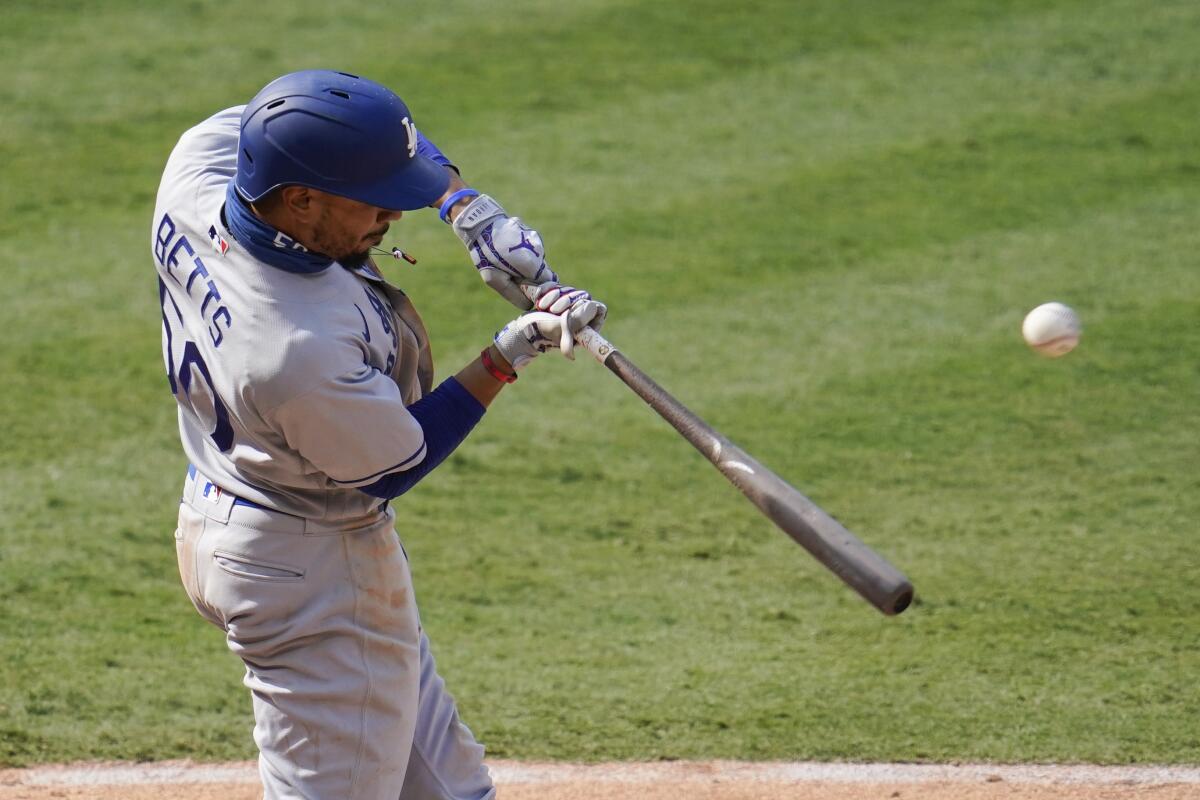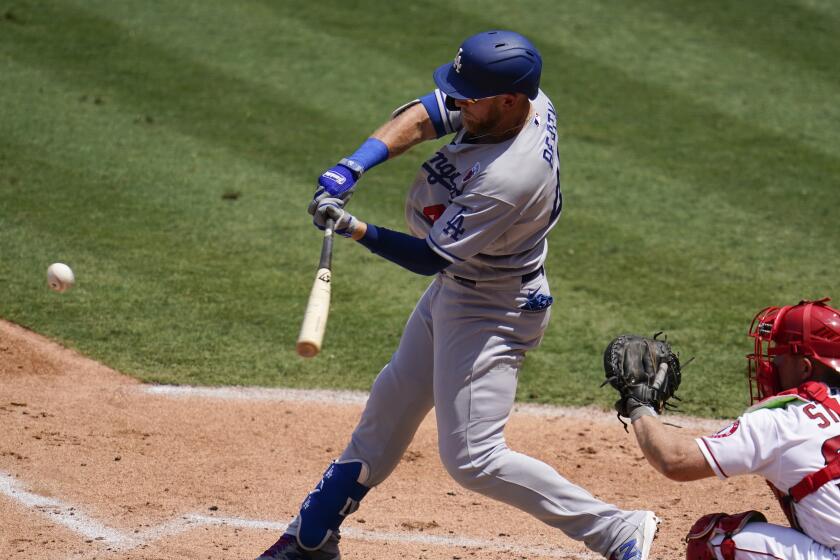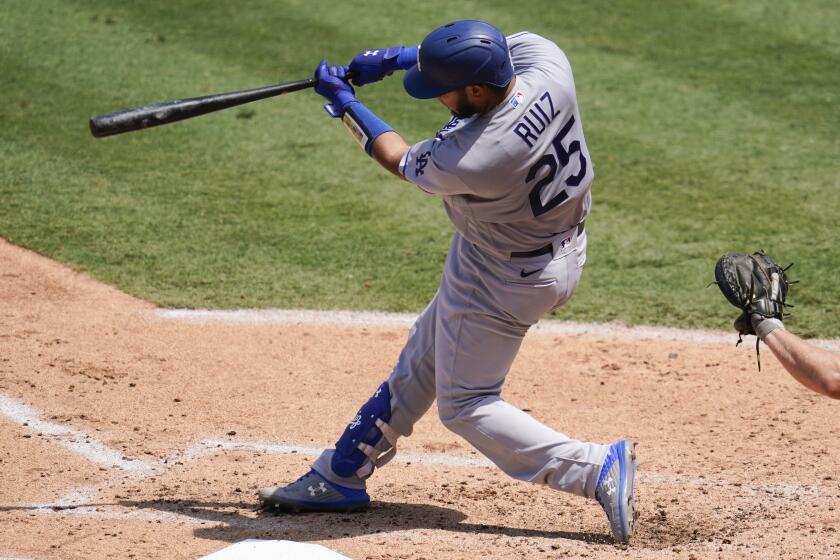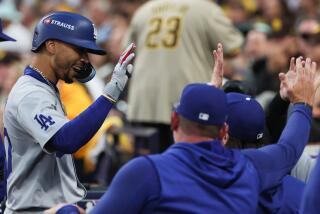Column: Mookie Betts earns every penny he’s paid by the Dodgers in ways apparent and obscure

This has to be a first, a player signing for $365 million and somehow overdelivering.
Whether expectations were tempered because baseball’s marketing failures kept him a relatively unknown in this part of the country or because fans have learned lucrative contracts don’t guarantee production, the reality is that Mookie Betts has been a revelation to Los Angeles.
Betts was expected to be good, very good even. Instead, he’s been great.
The early-season performance has made the Dodgers’ new leadoff hitter a rarity in a city fueled by excessive hype and populated by D-list celebrities. Betts isn’t fool’s gold. He isn’t a well-made facsimile. He’s the genuine article.
“I just don’t know how many more superlatives you can add,” manager Dave Roberts said.
More than a third of the way into an abbreviated season, the Dodgers have the best record in the National League. Betts has been their driving force.
The former American League MVP improved his average to .314 and drove in his 19th run in an 8-3 road win over the Angels on Sunday. His eight home runs are the most on the team.
He’s a better defender than advertised, smarter than advertised and certainly more powerful than advertised.
With their series sweep of the Angels, the Dodgers showed how much stronger their pitching and potent lineup is compared to their Southern California rivals.
Listed at 5 foot 9 and 180 pounds, Betts resembles a singles hitter. An active imagination could make him appear like a doubles hitter.
In actuality, his short and slender frame contains legitimate home-run power.
“It’s more power than I expected,” Roberts said. “You know that there’s the bat-to-ball, you know the defense, the arm strength, the accuracy, the foot speed. You know that he swings at strikes, takes balls. But the way he can leverage a baseball really impresses me.”
So much for the fears that Betts’ power was amplified by the asymmetrical layout of the Boston Red Sox’s home park and wouldn’t translate to Dodger Stadium. He averaged 27 home runs the last five seasons in Boston.
“There was an intrasquad game and he put [a home run] in the middle of the left-field pavilion and I just really couldn’t believe that,” Roberts said. “You know, Fenway Park, there’s doubles, it’s a short left field. But to see it at our ballpark, at night, it just excited me.”

Highlights from the Dodgers’ 8-3 win over the Angels on Sunday.
That power was showcased Thursday, when Betts blasted three home runs in a victory over the San Diego Padres. The three-home-run game was the sixth of his career, equaling the record previously shared by Johnny Mize and Sammy Sosa.
But he also has a steadiness that separates him from the other elite athletes who have played for the Dodgers in recent years — Matt Kemp, Yasiel Puig and Cody Bellinger, for example.
Mike Trout of the Angels might be the only other player as dynamic and consistent as Betts.
“I can’t remember anyone like that or like Trout,” Roberts said.
Roberts said the two superstars have something in common, which is an openness to instruction.
“When you have a certain talent and perform at a certain level, there’s always that kind of natural innateness of, ‘I’ve figured it out, I don’t need to be coached,’” Roberts said. “And, really, those two players have said it many times over, if they’re not being coached, then something’s wrong.”
The quality has made them all-around players. Roberts pointed to how when Betts started slowly on offense — he batted .200 in the first week of the season — he helped the Dodgers win with his defense.
“That’s the difference between good players and great players,” Roberts said.
Rookie Keibert Ruiz started at catcher for the Dodgers, replacing the injured Will Smith, and became the first Dodger in 26 years to homer in his first at-bat.
Anyone who says such greatness should be expected from a $300-million player has a point.
To a degree.
Before the COVID-19 pandemic, baseball was a $10-billion-a-year business. The economic climate made talented but imperfect players such as Bryce Harper and Manny Machado $300-million players.
Ridiculous as it seems, Betts’ deal could be classified as a bargain, especially when considering the $115 million in deferrals.
There were concerns that Betts’ low-key demeanor could limit his appeal in a town that celebrates oversized personalities. That could well be the case. But there’s also the possibility that his expressive style of play could make up for that and allow him to become one of the few soft-spoken athletes to transcend sports in this city.
Asked to imagine how fans would be receiving him if Dodger Stadium were open, Roberts replied, “I think that you should have about 40,000 No. 50 jerseys.”
Roberts continued, “I will say that because they don’t get to see him in person every day, you just can’t appreciate what he does. Running out to his position. On the bench, watching the game, talking to his teammates. The jumps on the baseball in the outfield and the ground that he really covers out there. And obviously how his teammates react to him when he gets a base hit or a homer or how he reacts to the success of his teammates.”
While Betts said he tries to not think about the pressure of playing up to his contract, he acknowledged, “Not going to say it’s not there, but I’m just embracing it. I’m just going in and playing my game and doing what I always do, not trying to do more, not trying to do less.”
And that’s made him a worthwhile investment.
More to Read
Are you a true-blue fan?
Get our Dodgers Dugout newsletter for insights, news and much more.
You may occasionally receive promotional content from the Los Angeles Times.











